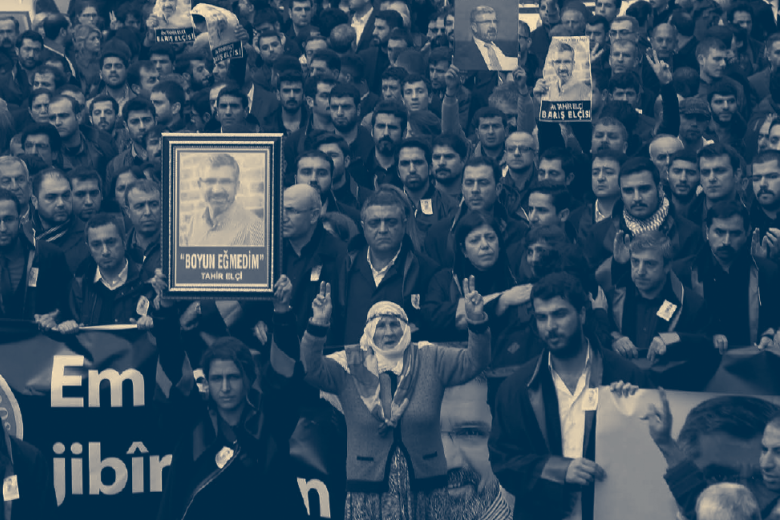Another brick in the wall? (Part 2)
This second post critically analyzes the decision of the Court, arguing that it is quite unconvincing from different perspectives.
Notes on the CJEU’s ruling on humanitarian visas for Syrians (Part 2)
The first part of this blog post has presented the ruling of the CJEU in C-638/16 PPU, X and X v État Belge, where the Court concluded that an application for humanitarian visa under Article 25(1)(a) of the Visa Code, with the intention to apply for asylum in the country for which the visa was requested, falls outside the scope of EU law. This second post critically analyzes the decision of the Court, arguing that it is quite unconvincing from different perspectives.
From a human rights angle, the result achieved by the Court is obviously disappointing. This family, as well as any other Syrian in need of protection, cannot rely on EU law and on the Charter in order to gain a legal, safe access to the territory of the Member States and seek asylum in the EU. EU law would only offer a solution if the legislator were to adopt a measure under Article 79(2)(a), providing common rules for the granting to third-country nationals of long-term visa on humanitarian grounds: hypothesis which seems at least unlikely in the current political landscape. But this is not the only point of criticism. The logic deployed by the Court is unconvincing too. The judges emphasized that the “defining feature of the situation at issue is … that the purpose of the application differs from that of a short-term visa” (para 47). In other words, it is the intention of the applicants to seek asylum in Belgium (thus remaining for more than 90 days in the territory of the Member States) to be the decisive factor in excluding the applicability of the Visa Code. However, Article 1(1) of the Visa Code, dealing with the “Objective and Scope” of the Regulation, does not mention the intention or the motivation of the request as a defining criterion for the applicability of the instrument. Rather, Article 32(1)(b) provides that visas shall be refused “if there are reasonable doubts as to … [the applicant’s] intention to leave the territory of the Member States before the expiry of the visa applied for”. Thus, the intention of the applications does matter in the context of the Visa Code, just not as a factor for the applicability of the instrument, but as a condition for the refusal of a visa. In other words, it does not entail not-applicability of the Regulation. The distinction introduced by the Court between the existence of “reasonable doubts” on the intention of the applicants, covered by Article 32, and the different purpose of the applications, which would not fall within the scope of the Regulation, feels rather artificial and does not have textual support in Article 1 of the Visa Code. Had the applicants not disclosed their (real) intention, would EU law be applicable? It seems so. The intention of an applicant does not seem however a reliable criterion for the determination of what falls within the scope of EU law, in this context as well as in other foreseeable situations. Moreover, the Luxembourg Court failed to consider that the right of residence of the applicants after the 90 days would not derive from the humanitarian visa, but from their request of international protection (compare with para 53 of Mengozzi’s Opinion).
It is hard not to conclude that the Court of Justice simply found the easiest way out from an extremely sensitive case, with profound political – thirteen Member States, and even the Commission, intervened to support Belgium – and legal implications, in particular on the general structure of the common asylum system (see para 49 of the ruling). By concluding that the case falls outside the scope of EU law, the CJEU did not have to engage the hard questions raised by the preliminary reference, including: the extraterritorial application of the EUCFR, the extent of Member States’ discretion in conferring humanitarian visa according to Article 25 Visa Code, the possible existence of positive obligations under Articles 4 and 18 of the Charter, and finally the practical and legal consequences which would derive from the opening of broader safe legal ways to the territory of the EU. It is the Court’s lack of engagement with these questions which I find particularly regrettable. Yes, the case had political implications and could have disrupted the smooth functioning of the Dublin system (one may then argue that the functioning has hardly been smooth since well before the ruling, but that is a different story…). Yet, these are not reasons for dodging the questions referred. Rather, they call for striking a balance between different and competing interests: the division of competences between the EU and the Member States, the need to guarantee the effect utile of EU legislation (including the asylum system), and of course the obligations to respect human rights deriving from the Charter and the ECHR.
Furthermore, the Court’s reliance on the EU legislator, suggested by paragraph 44 of the ruling, in which it refers to the legal basis of Article 79(2)(a) TFEU as a means to introduce humanitarian “long-term visa”, is blind both to the EU political context and to the human rights situation in Syria: can we truly expect families and individuals in Aleppo or other war zones to wait for EU institutions to reach an agreement on a new piece of legislation, before fleeing their country and seeking international protection? There is little doubt that their interests are hardly a priority in the political and legislative debate at the EU level - it is certainly not a coincidence that the efforts of EU institutions focused on curbing illegal routes to access to the EU and on the internal allocation of responsibilities, rather than on the creation of safe legal routes. This is where courts, and especially human rights courts, may come to the rescue of those in need of protection, as advocated by Mengozzi. The CJEU has refused to do so, showing reluctance to consider the human (rights) dimension of the question it was confronted with, and ultimately shedding further doubts on its capacity to act as a true human rights court. After the almost universal criticism received for the decision in Opinion 2/13 the Court has been able to deliver more convincing human rights rulings, for example in Aranyosi and Caldararu and C.K. v Slovenia, by attempting to bringing together interests potentially conflicting: in the two mentioned cases, protection of human rights, on the one hand, and mutual trust and mutual recognition, on the other. I would submit that X and X is a missed opportunity to follow that path.
A final note: the critical analysis of the ruling conducted in the post does not imply that the Court should have simply followed the Opinion of Advocate General Mengozzi. For reasons of space, I cannot analysis the Opinion in detail, but there are at least two elements which are in my view not fully persuasive. First, Mengozzi argues that Member States are obliged under Article 25 Visa Code to consider the humanitarian grounds brought forward in the visa application, and if the grounds are well founded, the Visa Code obliges them to grant the visa (see para 127 of the Opinion). The reasoning is based on the use of the word “shall” in Article 25(1). However, the sentence continues: visa shall be issued exceptionally “when the Member States concerned considers it necessary on humanitarian ground”. This formulation clearly hints that the Member States have a broad discretion in evaluating the humanitarian grounds. While it is true that Member States are bound by the Charter even when they have discretion (as held for example in N.S.), it seems hard to transform the provision in the strict obligation suggested by Mengozzi, which would basically not only limit but in substance eliminate any margin of action for the Member States.
Secondly, the AG argues for the extraterritorial application of the Charter: where EU law applies, the Charter applies, irrespective of any limitation similar to those of Article 1 ECHR. While this seems to be in line with the wording of Article 51(1) EUCFR as previously interpreted by the CJEU, I believe that further reflection is needed on the concept of positive obligations in extraterritorial situations. Mengozzi concludes that Member States have a positive obligation under Article 4 EUCFR (prohibition of torture and human or degrading treatment) to “[take] the measures within its power to avoid exposing third-country nationals seeking international protection” to genuine risks of inhuman treatment prohibited by Article 4 (para 152). The reasoning is based mostly on the concept of positive obligations as developed in ECtHR case-law on Article 3 of the Convention (including for example El-Masri v. The former Yugoslav Republic of Macedonia). However, the ECHR would most likely not be applicable to the case of X and X, as the Syrian family would not be “within the jurisdiction” of Belgium as required by Article 1 ECHR. In my view, a simple translation of the ECtHR case-law on positive obligations in cases of extraterritorial application of the Charter is not sufficient. Further reflection is needed on the boundaries on the concept of positive obligations in this context, in order to better define the duties EU Member States have vis-à-vis subjects who are not their nationals nor within their jurisdiction. By dodging the meaningful and complex questions referred to it, however, the Court of Justice has done very little to stimulate this reflection.
This blog is published on Law Blogs Maastricht
M. Bonelli
Matteo Bonelli is Associate Professor of EU Law at the Faculty of Law of Maastricht University.
Matteo's research focuses on EU constitutional law, and in particular on the EU's tool to protect its fundamental values. I have published also on other topics of EU institutional, constitutional and fundamental rights' law.
In Maastricht Matteo is a member of the Maastricht Centre for European Law (MCEL) and the Globalisation and Law Network.

-
The EU’s race to the bottom on asylum seekers’ rights
Throughout the EU, the rights of asylum seekers come under pressure. Overdue policy changes remain stuck in negotiations because of lacking political will. It is up to the European Commission to step up and protect the fundamental rights of asylum seekers.

-
Hurbain v. Belgium: towards a fairer balancing exercise between the right to freedom of expression and the right to privacy?
Admittedly, the right to erasure, or more colloquially, the right to be forgotten is nothing new in the European legal landscape. Indeed, this right can be found as far back as 1981 in the predecessor of the Modernised Convention for the Protection of Individuals with regard to Automatic Processing...

-
How many times can the ECtHR turn its head
Thank God for Judge Egidijus Kūris. In ECtHR ruling Ahmet Hüsrev Altan v. Turkey of 13 April, he showed that decontextualized analysis is not inherent to supranational judicial review. Once again saucing up his dissent with Bob Dylan, he asked “how many times can [the ECtHR] turn [its] head and...
